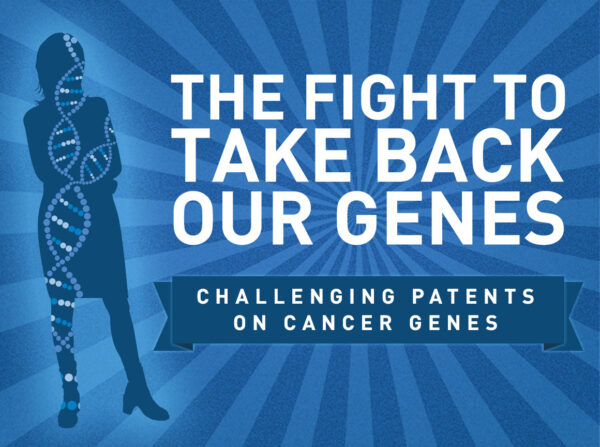Divided Appeals Court Again Rules That Companies May Patent Breast Cancer Genes, but Invalidates Patents Comparing the Genes
Supreme Court Sent Case Back for Consideration After Ruling in Similar Case
FOR IMMEDIATE RELEASE
CONTACT: (212) 549-2666; media@aclu.org
WASHINGTON – In a 2-1 decision, a federal appeals court once again today partially reversed a lower court’s ruling in a case challenging patents on two human genes associated with hereditary breast cancer and ovarian cancer. The court ruled that companies can obtain patents on the genes but cannot patent methods to compare those gene sequences.
This is the second time the court has considered this lawsuit, brought by a group of patients and scientists represented by the American Civil Liberties Union and the Public Patent Foundation (PUBPAT). Last year, the U.S. Supreme Court ordered the case to be re-heard after ruling in a similar case that patents cannot be issued on natural processes. The same three appeals court judges re-heard the case.
“It is extremely disappointing that despite the Supreme Court’s ruling, the appeals court has failed to fully re-consider the facts of this case,” said Chris Hansen, a staff attorney with the ACLU Speech, Privacy and Technology Project. “This ruling prevents doctors and scientists from exchanging their ideas and research freely. Human DNA is a natural entity like air or water. It does not belong to any one company.”
The lawsuit against Myriad Genetics and the University of Utah Research Foundation, which hold the patents on the genes, charged that the challenged patents are illegal and restrict both scientific research and patients’ access to medical care, and that patents on human genes violate the First Amendment and patent law because genes are "products of nature."
“Human genes are not like new genetic tools or drugs, which can be patented because they are manufactured,” said Daniel B. Ravicher, executive director of PUBPAT and co-counsel in the lawsuit. “It is absurd to think that a company CAN own naturally-occurring human genes simply because they removed them from the body.”
The specific patents the lawsuit challenged are on the BRCA1 and BRCA2 genes. Mutations along those genes are responsible for most cases of hereditary breast and ovarian cancers. Many women with a history of those cancers in their families opt to undergo genetic testing to determine if they have the mutations on their BRCA genes that put them at increased risk for these diseases. This information is critical in helping these women decide on a plan of treatment or prevention, including increased surveillance, preventive mastectomies or ovary removal.
Myriad's monopoly on the BRCA genes allows it to set the terms and cost of testing and makes it impossible for women to access alternate tests or get a comprehensive second opinion about their results. It also allows Myriad to prevent researchers from even looking at the genes without first getting permission.
“This is a devastating decision for a woman’s health,” said Sandra Park, staff attorney with the ACLU Women’s Rights Project. “Patients facing life-changing medical decisions deserve the best quality care and research available. They should not be blocked from getting that care because a company owns the exclusive right to access their genes.”
Several major organizations, including the American Medical Association, the March of Dimes and the American Society for Human Genetics, filed friend-of-the-court briefs in support of the challenge to the patents on the BRCA genes. In addition, the United States Department of Justice filed a brief for the second time, arguing that many of the gene patents issued by the Patent Office are invalid.
Attorneys on the case include Hansen and Aden Fine of the ACLU Speech, Privacy and Technology Project; Park and Lenora Lapidus of the ACLU Women’s Rights Project; and Ravicher and Sabrina Hassan of PUBPAT.
Today's decision can be found online at:
www.aclu.org/womens-rights/association-molecular-pathology-et-al-v-us-patent-and-trademark-office-et-al-decision
More information about the case, including ACLU videos featuring breast and ovarian cancer patients, plaintiff and supporter statements and declarations and the legal complaint, can be found online at: www.aclu.org/brca


